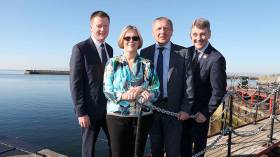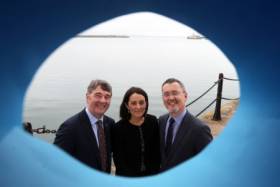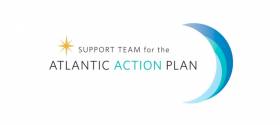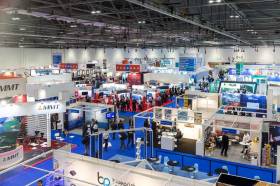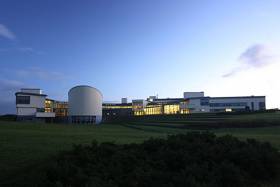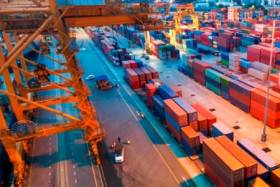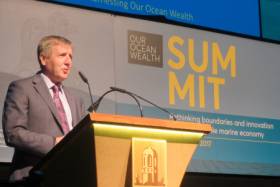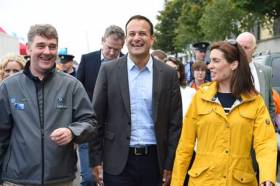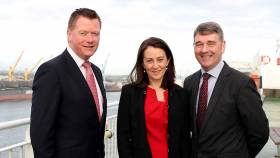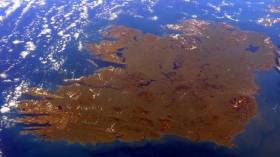Displaying items by tag: Blue Economy
#OurOceanWeath - Employment growth of more than 16% in the marine sector was among the encouraging statistics cited by Marine Minister Michael Creed in his address to the Our Ocean Wealth Summit, which opened at Galway Docks yesterday (Thursday 28 June).
“Ireland has taken important strides in recent years in developing our blue economy. This is being driven at the highest levels of Government and represents a unique and joined up approach to growing Ireland’s blue economy.
“The work of our cross Departmental high level Marine Co-ordination Group (MCG), which I chair, will continue as we seek to build on recent success,” Minister Creed said.
Updated statistics indicate that the direct economic value of Ireland’s ocean economy now stands at €2 billion, or approximately 1% of GDP, which represents a 21% increase on 2015 figures.
“The 2017 estimates suggest that our ‘blue economy’ continues to grow at a faster pace than the general economy,” the minister added. “Growth in 2017 is being driven by strong performances in the aquaculture, sea fisheries, shipping and marine tourism industries as well as continued growth in the emerging ocean industries.
“A really encouraging statistic is the growth in employment for the marine sector which has risen from 27,888 (FTEs) in 2015 to an estimated 32,509 (FTEs) in 2017, an increase of 16.6%.”
Minister Creed also announced the publication of the latest annual Progress Report on Ireland’s Integrated Marine Plan - Harnessing Our Ocean Wealth.
“This report which covers inputs from across state departments and agencies, provides a wealth of information, spanning governance, research, education, international co-operation, business development, sustainability, and protection and conservation of marine ecosystems,” he said.
The Our Ocean Wealth Summit, now in its fifth year, forms a key part of the Government's integrated plan for Ireland’s marine sector and brings together national and international expert speakers, industry leaders, business development agencies and the Irish business and marine research community. This year’s discussions focused on the overall theme of ‘Investing in Marine Ireland’.
Ahead of the summit, PwC and the Marine Institute released the results of a joint survey of leading voices in Ireland’s maritime industry, which revealed “overwhelming confidence in Ireland’s maritime sector in spite of challenges posed by Brexit”.
Other findings include the potential of offshore wind and ocean energy, which is seen as a key opportunity for the marine sector, while overall, maritime leaders believe further investment in the marine industry is critical.
The Our Ocean Wealth Summit is part of a range of industry and innovation events taking place in Galway as part of SeaFest 2018, Ireland's national maritime festival, which opens today (Friday 29 June). A wide range of public events are taking place in Galway Harbour and Docks and the city over the weekend till Sunday 1 July.
Among them will be Life and the Sea, a special civic and military commemorative event to remember all those who have lost their lives at sea, and recognising the heroism of the men and women of our rescue services.
Mayor of Galway City, Niall McNelis, will address the special commemoration which will take place at 6pm on board the LÉ William Butler Yeats in Galway Harbour.
There will be musical performances, while poems will be read by Tony Hiney, community fundraising manager of the Western Region of the RNLI, and Lt Cdr David Fleming, Officer Commanding of the LÉ William Butler Yeats.
Minister of State Seán Kyne, accompanied by Mayor McNelis, and RNLI, Irish Coast Guard, Naval Service and Air Corps representatives will lay a wreath.
A lone piper will play, which will be followed by ship horns and a flyover by the Air Corps.
#MarineEconomy - Ireland's marine economy worth an annual turnover in excess of €5.7m billion, has been on a steady growth trajectory over the past decade.
Optimising, commercialising, managing and protecting this blue economy, worth over €2 billion directly to the economy each year, is the focus of the Our Ocean Wealth Summit sponsored by PwC which takes place on 28 and 29 June in Galway.
This year's Summit has attracted high level marine sector speakers from across the globe including Blue Planet producer Orla Doherty, US Astronaut and Oceanographer Kathryn Sullivan, Jose Santos, Chairman of the Oceano Azul Foundation (Portugal), Claire Jolly, Head of Ocean Economy at the OECD and Investment Manager with Equinor (Statoil) Jill Tully among other international business and marine leaders.
Minister for Agriculture, Food and Marine Michael Creed T.D., Climate Justice Foundation CEO Mary Robinson, Yvonne Thompson, Partner at PwC, Julie Sinnamon of Enterprise Ireland and BIM CEO Jim O'Toole are among the Irish leaders that will address the Summit on investing in our blue economy and managing the challenges it faces.
"Being an island nation, Ireland has a real opportunity to lead in terms of innovation, competitive advantage in the seafood sector, shipping services, marine industry, renewable energy and connected marine devices and solutions. This event, as a key output of the Harnessing Our Ocean Wealth strategy, brings the vital and various elements of Ireland's marine sector, the experts and experience, together to convene, network and share knowledge required to drive forward our blue economy," said Minister for Agriculture, Food & Marine Michael Creed.
The 2 day conference will focus on Ireland's multi-billion euro marine economy, discussing the impact of Brexit, smart shipping, sea and airfreight logistics and Ireland’s seafood sector, marine renewables, marine research, maritime commerce, financial planning for the marine, climate change and more. See www.ouroceanwealth.ie
Speaking at the launch of the Our Ocean Wealth Summit themed "Investing in Marine Ireland", Marine Institute CEO Peter Heffernan said, "Ireland's oceans represent enormous commercial opportunities and this Summit will be relevant to organisations involved in offshore renewable energy, marine biotech, aquaculture and fisheries, shipping, marine mining and exploration as well as subsea and offshore technology including robotics, communications, sensors and data analytics.
We are also mindful of the need to manage this incredible blue resource to ensure its viability and health into the future. This year's Summit represents an enormous opportunity to be part of a national and international event where marine leaders will be sharing insights, networking and engaging with delegates over the 2 days of the Summit as part of the national maritime festival, SeaFest."
Our Ocean Wealth Summit has a packed agenda that includes an in-depth discussion on Ireland's seafood sector and the impact of Brexit, smart shipping, sea and airfreight and logistics for the fishing sector, an interactive session on marine renewables, as well as insights and thought leadership on climate change. Marine research and development, maritime commerce, financial planning for the marine and aviation leasing will also be topics discussed at the Summit this year.
Speaking at the 2018 launch, PwC Partner, Declan McDonald, said: "The central theme of investment for the 2018 Summit demonstrates how the integrated marine plan for Ireland is moving into a new phase of commercial engagement beyond EU and Government funding. We see this theme developing globally with many investment managers and investors actively engaged in funding projects in line with the UN sustainable development goals. We see significant activity in the ocean economy to attract investors seeking returns beyond philanthropy. PwC in Ireland and globally continues to raise awareness and support the sustainable development of the ocean economy recognising that the oceans' health and wealth are inextricably linked."
Our Ocean Wealth Summit will also include a Marine Ireland Trade Show, where over 60 companies and organisation in the sector will showcase their innovative marine products and services.
Now in its fifth year, Our Ocean Wealth Summit in association with PWC is supported by a number of partners including IDA Ireland, Enterprise Ireland, Sustainable Energy Authority of Ireland (SEAI), Science Foundation Ireland, Failte Ireland, Bord Iascaigh Mhara (BIM) and the Irish Maritime Development Office (IMDO).
The Summit is an output of Harnessing Our Ocean Wealth, the Government's integrated plan for Ireland's marine sector, which aims to double the value of the marine economy's contribution to GDP by 2030.
See www.ouroceanwealth.ie for more details.
The EU’s 2013-2020 Atlantic Action Plan has spurred over 1,200 new maritime projects and nearly €6 billion of investments so far, according to an independent consultant tasked by the EU to take stock of the initiative at mid-term.
Most of the projects target environmental protection and innovation, as well as improved connectivity and social inclusion.
In 2013, the EU launched the Atlantic Action Plan to boost the maritime economy of its five Atlantic states: Portugal, Spain, France, the United Kingdom and Ireland, and their outermost regions.
By mid-2017, hundreds of initiatives had cropped up and started contributing to these goals, says the independent study:
500 projects are investing €2.1 billion on the environment – from developing marine renewable energy in France to novel biotechnological applications in Portugal.
- 500 projects, worth €750 million, target innovations like broadband connectivity in remote areas of Scotland, or maritime spatial planning in Macaronesia.
- Some 100 projects invest €2.4 billion to improve accessibility and connectivity, mainly by developing port facilities in Spain and Ireland.
- Around 100 projects worth €360 million promote social inclusion, for example by improving tourism infrastructure in Wales or remote health monitoring in Ireland.
The funding comes from a variety of sources such as the EU (funds for regional development, R&D and the blue economy), the European Investment Bank, national, regional and private sources. The assessment argues that with the Atlantic plan, the community of stakeholders in the Atlantic Ocean area has grown stronger and better at raising funds for marine and maritime projects.
Some 20 projects, involving 320 international research teams, are not just European but involve our transatlantic neighbours as well, thanks to the Galway Statement and the Atlantic Ocean Research Alliance between the EU, the US and Canada.
The European Commission will use the results of the independent study – and of the public consultation that was held last year – to fuel a discussion with the countries concerned and improve the plan’s performance even further between now and 2020.
This could include more specific objectives and key performance indicators to assess results further down the line, and designing more joint cross-border projects, with greater involvement of coastal regions.
#BlueEconomy - Marine Minister Michael Creed this week visited the Oceanology International trade exhibition in London on day two of his six-day visit to the UK.
Held every two years, Oceanology International at ExCeL London is recognised as the leading ocean technology and marine science event in the world, attracting more than 8,000 attendees and 500 exhibitors from over 79 countries.
Commenting on the event, Minister Creed said: “As chairman of the Government’s Marine Co-ordination Group, this is an important opportunity to support efforts to promote Irish organisations providing products and services for global marine services and furthermore to highlight Ireland as an attractive location for inward investment in the blue economy.
“The vision of the ‘Harnessing Our Ocean Wealth’ Strategy is to expand the Irish ocean economy to a value of 2.4% of GDP by 2030.”
€108,000 Awarded To Early-Stage Marine Researchers
#MarineScience - The Marine Institute awarded €108,000 in grant-aid funding to 94 recipients in 2017 under its Networking & Travel Awards.
This scheme, funded under the Marine Research Programme with the support of the Government, makes awards to provide assistance for networking activities that support the goals of the Harnessing Our Ocean Wealth Strategy.
They also constitute an important part of the implementation of the National Marine Research and Innovation Strategy 2017-2021, which was launched in June this year.
The main focus of the Networking & Travel Awards is to give early-stage researchers, post-graduate students, research assistants and intern staff an opportunity to present their marine research to an international audience, network with international marine experts, and promote research carried out in Ireland on the global stage.
Seventy-seven applicants received travel awards for this purpose. A further nine awards were made in support of hosting marine conferences or workshops in Ireland and for the establishment of international networks for leveraging marine funding.
A final eight awards were for the mobility of research expertise by SMEs for the transfer of knowledge in science and technology towards the development of the marine sector.
Since 2014, 41 participating Irish marine organisations have successfully partnered in 77 marine-related EU projects, bringing a minimum of €29.7 million in EU grant-aid to Ireland.
This represents 7% of the total available drawdown for Ireland for a range of research, development and innovation projects.
Next year’s call for the Marine Institute Networking & Travel Awards will open a month from now in mid-January.
#Ports&Shipping - Ireland’s shipping and transport sector was the largest contributor in terms of turnover to the growth of the country’s blue economy’ in 2016.
Shipping is also responsible for the FTE employment of 4,666 people, an increase of 6.7% since 2014, according to the latest report from the Socio-Economic Marine Research Unit.
Afloat.ie previously reported on figures from the fourth SEMRU report that show the ‘blue economy’ is outperforming Ireland’s general economy.
But the report also details now sea-based transport in particular accounted for 85% of the total volume and 56% of the total value of goods traded in Ireland in 2016, and continues to be the largest contributor to Ireland's ocean economy in terms of turnover and Gross Value Added (GVA).
The positive trend is also reflected in a report released earlier this year by the Irish Maritime Development Office (IMDO), the Irish Maritime Transport Economist, which records a 2% increase in total port traffic in 2016, the highest level of throughput achieved since 2007.
Speaking after the launch of Ireland’s ocean economy report during SeaFest 2017, Ireland’s national maritime festival, IMDO director Liam Lacey said: “Ireland has very ambitious targets set out in the Government’s integrated marine plan for Ireland, Harnessing Our Ocean Wealth, which aims to increase the value of Ireland's marine economy to 2.4% of GDP by 2030.
“The latest report published by SEMRU shows that we are well on course to achieve this, with our shipping and maritime transport sector contributing enormously to the growth and potential of our marine economy.
“As an island nation, we are heavily dependent on sea-based transport to link Ireland to world markets and I am delighted to see further positive indicators of the potential of this sector to contribute to wider economic growth in Ireland, and also its resilience in what was a very challenging year for business.”
National Marine Research & Innovation Strategy Launched
#MarineScience - The new National Marine Research & Innovation Strategy 2017-2021 aims to fulfil the need for a strategic marine research agenda to promote cross-agency collaboration, says Ireland’s Marine Minister.
Michael Creed welcomed the new strategy during SeaFest 2017, Ireland’s national maritime festival, at the Our Ocean Wealth Summit last Friday (30 June) — at which it was announced that Ireland’s ‘blue economy’ is outperforming the general economy, as previously reported on Afloat.ie.
The strategy was prepared by the Marine Institute on behalf of the Marine Coordination Group, and supports the implementation of Innovation 2020, Ireland’s national Research and Innovation Strategy, which identifies the marine sector as one of eight areas of focus for social progress and the economy.
“This new strategy follows on from Sea Change, the last national marine research strategy published in 2007, and will help ensure that Ireland maintains its position at the forefront of marine research in Europe,” said Marine Institute chief executive Dr Peter Heffernan.
“This strategy will ensure that the outputs of new research and innovation will support Ireland’s quest to generate real socio-economic benefits by reaching the 2020 target of a €6.4 billion ocean economy in a sustainable manner.”
The strategy provides a framework for research funders to assess the impact and likely return to the State from research investment in marine related research themes.
It is also designed to ensure that State support of marine research results in Irish researchers being able to compete at an international level and participate fully in transnational research projects.
Preparation of the strategy included a review of national and international marine related strategies and plans, which identified 15 broad research themes such as energy, transport, biodiversity and bioresources.
Each of these themes were the subject of a detailed review of the research capability in Ireland and the steps required to raise this to meet research requirements of national strategies such as Food Harvest 2025 and the Energy White Paper ‘Ireland’s Transition to a Low Carbon Energy Future 2015-2030’.
Welcoming the publication of the strategy on behalf of the board of the Marine Institute, chair John Killeen said: “We look forward to it informing the institute’s own investments, including our plans to co-fund with other Government agencies and departments on projects in a range of marine related research disciplines.”
The launch of the National Marine Research & Innovation Strategy 2017-2021 at the Our Ocean Wealth Summit was accompanied by the publication of New Connections III (2014-2016), which records the success of the Irish marine research community in competitive EU funded programmes such as Horizon 2020, INTERREG-V and ERASMUS+.
#BlueEconomy - The ‘blue economy’ is outperforming Ireland’s general economy, according to Galway’s Socio-Economic Marine Research Unit.
Figures from the fourth SEMRU report released for the Our Ocean Wealth Summit on Friday (30 June) show that the direct economic value of Ireland’s ocean economy was €1.8 billon, or around 0.9% of GDP in 2016 - a 20% increase on 2014 levels.
The ‘blue economy’ also provided jobs for more than 30,000 people in 2016, the report noted.
Marine Institute chief executive Dr Peter Heffernan welcomed SEMRU’s findings during Friday’s summit at NUI Galway as part of SeaFest 2017.
“Investment in research for Ireland’s marine sector has been essential in shaping the strategic development of our blue economy,” he said. “These timely marine economic statistics are vital for evidence-based policy and decision making.
“It’s very encouraging to see that established sectors are performing so well, and that emerging sectors such as those providing advanced marine technology products and services, and renewable energy, are experiencing rapid growth in Ireland's ocean economy.”
Dr Heffernan added: “The ambition set out in the Harnessing Our Ocean Wealth Strategy is to achieve a €6.4 billion ocean economy by 2020 and to do this in a sustainable manner requires joined up thinking and close collaboration between agencies and organisations driving innovation, progress and success in our marine sector.
“The SEMRU reports are a key component of Ireland's marine strategy which requires comprehensive and targeted surveys and reporting, so that we can benchmark the marine sector with other sectors, monitor progress and performance and create a better understanding of the dynamics of the marine sector.”
Friday also saw the launch of Ireland’s National Marine Research & Innovation Strategy by Marine Minister Michael Creed. The new plan, which covers 2017 to 2021, was welcomed by Marine Institute chair Dr John Killeen.
“The Marine Institute, as the national agency for marine research and development, was pleased to co-ordinate the development of this strategy,” he said. “We look forward to it informing the Institute's investments, including our plans to co-fund with other government agencies and departments on projects in a range of marine related research disciplines.”
The Harnessing Our Ocean Wealth Progress Report 2017 was also published at the summit, which took place as part of SeaFest, the national maritime festival, which concludes today (Sunday 2 July) in Galway.
Taoiseach Leo Varadkar attended events in the City of the Tribes yesterday (Saturday 1 July), greeting festival goers as he explored the activities and entertainment at Galway Harbour and Docks.
This included tours of scientific vessels like the RV Celtic Explorer, and seeing local boatbuilders’ demonstration of their craft.
PwC Makes Sponsorship Deal For Our Ocean Wealth Summit
#OurOceanWealth - Professional services giant PwC has announced a new three-year headline sponsorship of the Our Ocean Wealth Summit, the fourth of which takes place in Galway next month.
The one-day summit on Friday 30 June at NUI Galway coincides with Ireland’s national maritime festival SeaFest 2017 in the City of the Tribes.
Speaking at the partnership announcement, PwC advisory partner Declan McDonald said: “Having worked with the Irish Marine Development Office for a number of years, we are delighted to formalise our partnership with them and assist the Marine Development Team and the broader Marine Institute to continue the great work they are doing in achieving the ambitions set out in Harnessing Our Ocean Wealth.
“Our seas are a vital national asset and very important to Ireland's future economic success, and the Our Ocean Wealth Summit provides a unique platform for the opportunities of our blue economy to be brought to the fore.”
McDonald added: “The opportunities for the blue economy do not come without challenges, both immediate in terms of the potential economic impact of Brexit on our ports and fisheries, but also in the longer term in terms of sustainable development and protection of our sensitive marine environment.
“We look forward to overcoming these challenges with Peter and the team in the Marine Institute bringing both local and global marine sector expertise from around the PwC network."
Marine Institute chief executive Dr Peter Heffernan said: “Ireland's marine sector has enormous potential for growth and our ambition is to be at the forefront globally as a leader in both traditional and emerging marine activities.
“PwC's support, as an internationally recognised leader in professional services, reaffirms this ambition and we look forward to working closely together to realise the potential of Ireland's marine economy.”
Renowned innovation expert Tom Kelley was confirmed in March to speak at the fourth Our Ocean Wealth Summit, which will also feature economist, writer and broadcaster David McWilliams; Miguel Marques, partner at PwC Portugal and Economist of the Sea; Terry Garcia, former vice president of National Geographic and CEO of Exploration Ventures; and many more.
Tender For New ‘Umbrella Brand’ For Ireland’s Marine Sector
#BlueEconomy - The Irish Maritime Development Office (IMDO) is inviting tenders for the supply of services to develop a new ‘umbrella style’ brand identity for Ireland’s ‘blue economy’.
The new tender from the IMDO – the Government agency responsible for the development, promotion and marketing of the Ireland’s maritime sector – would involve the development of a brand story, guidelines and video to communicate Ireland’s overall marine offering on a B2B basis, both nationally and internationally.
The new brand identity is to be developed in support of the recently established Marine Development Team (MDT), a specific-purpose, Government-funded task force that will work in collaboration with a number of Government development agencies with the overall goal of developing Ireland’s ocean economy.
The closing date for responses is Tuesday 14 February. Find out more about this tender HERE.


























